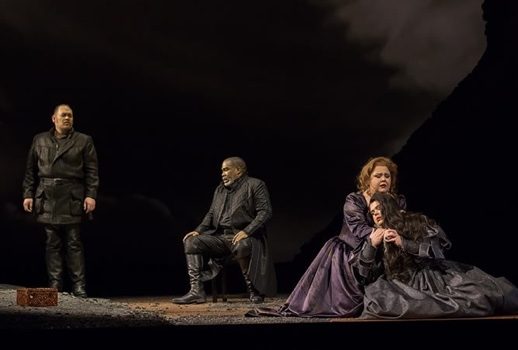

Indeed, if Washington National Opera’s presentation of Don Carlo went over well, the consistently mid-to-high level musical values weren’t exclusively the reason. Even in a predictably conservative production and even in the four-act Italian version (with further snips therein), D.C. audiences know their political theatre and respond accordingly.
But despite minor drawbacks, the production, WNO’s first in 20+ years, allowed Verdi’s opera to shine, as perfectly constructed and musically rich as it is.
Though I remain doubtful about Francesca Zambello as a tastemaker, the first cast of WNO mainstays and American up-and-comers that she assembled proved competent-to-stellar. On the night I heard him, Russell Thomas was wildly inconsistent as the titular infante. Though his limpid, evenly-produced tenor has spin at the top, he had a negligible lower register to push on and with occasionally compromised vocal production.
Further, most of the words were lost from weak diction and a tormented portrayal that shortchanged some of the passion from Verdi’s score. Though I’d have preferred to hear a voice like his singing this opera in French, I think it probably wouldn’t have made a difference.
If Eric Owens’s bass-baritone was a shade too light to suggest authority as Filippo II, the sheer beauty of his singing and deeply-felt emotional candor of “Ella giammai m’amò” made up for it. Conversely, his consort Elisabetta was the staid Leah Crocetto, whose merely pretty voice and nondescript presence were short on authority with the text and shorter on gravitas. However, her “Tu che le vanità” was a committed cap to a musically riveting second half of the evening.
Jamie Barton, on the other hand, turned in a compelling, magisterial Eboli that hinted at even further rewards as she grows in the role. Her rounded, richly-colored mezzo fit snugly into both her arias with “O don fatale” being the real showstopper and, if she spun a sultry yarn in the Veil Song, the delicious coloratura licks and trills seemed not quite integrated with the rest of the piece. The lower voices were rounded off by the endlessly congenial Quinn Kelsey as an urgent Rodrigo whose gorgeous, supple, fully-supported baritone continues to reveal itself as an asset to Verdi’s music.
If the first cast was solid, the customary “Young Artist” performance towards the end of the run was, in some ways, even better, and it was to the credit of the ladies. Melody Moore brought a much-needed regality to Elisabetta, contrasting passion with repression, and thoughtful, provocative phrasing. Her aria at the tomb was a masterclass in phrasing, subdividing the lengthy aria into smaller, emotionally-motivated fragments. She was supported by one of the WNO Young Artist Program étoiles, Daryl Freedman as Eboli. Still learning to wield her sizeable voice, Freedman crafted a human Eboli with glorious low notes and two solid arias.
Peter Volpe’s imposing voice was better suited to the King’s character (and especially well-suited to the voice in Charles V at the rest of the performances), but significantly less expressive Troy Cook was a less vocally glamorous Posa and sometimes struggled to make himself heard over the orchestra, but played well against Rafael Davila, a hotheaded and muscular-voiced tenor as Carlo.
Andrea Silvestrelli, costumed like Gandalf, lent his patchy bass and generous altitude to The Grand Inquisitor at both performances and Allegra de Vita was luxuriously cast as Tebaldo.
Philippe Augiun’s valedictory conducting assignment at Music Director ranged from the stereotypically oom-pah-pah to hair-raising in choral scenes featuring the admirably cohesive WNO Chorus and Orchestra. Though he sometimes covered the singers, Auguin’s WNO performances have set a high bar in terms of musicality, cohesion, and point of view. His departure will certainly be deeply felt.
Thomas C. Hase’s intelligent lighting almost compensated for Andrew Lieberman’s handsome set that failed at evoking the libretto’s many real-life locations. Constance Hoffman’s costumes offer proof that WNO is committed to dressing everyone in random separates from the sale rack at T.J. Maxx. The singers wore them dutifully through Tim Albery’s serviceable if over-blocked production.
























Comments